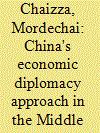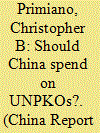|
|
|
Sort Order |
|
|
|
Items / Page
|
|
|
|
|
|
|
| Srl | Item |
| 1 |
ID:
163379


|
|
|
|
|
| Summary/Abstract |
This study analyses China’s economic diplomacy approach in the Middle East conflicts in order to explore the following question: How does China use diplomatic means to protect and pursue commercial investments, economic assets, and economic tools, and to advance its foreign policy goals in the Middle East conflict zones? This study argues that despite its adherence to the principle of non-intervention, Beijing’s economic diplomacy has a more flexible and pragmatic interpretive approach. Chinese economic diplomacy in the Middle East uses its diplomatic resources to intervene as needed to safeguard its investments and assets, and utilises economic incentives to promote its well-defined foreign policy goals in the region’s hotspots.
|
|
|
|
|
|
|
|
|
|
|
|
|
|
|
|
| 2 |
ID:
163378


|
|
|
|
|
| Summary/Abstract |
In this article, land acquisition (LA) in India and China since the 1980s has been theorised as an ‘ideal’ model, namely, compulsory development, which highlights the extremely active role of the state and the compulsory measures it takes for LA in both countries in order to achieve its development goals. In both countries, the state acts as the land use planner, regulation maker in the land administration, as well as a major land developer and most influential player in the land market. At the same time, it extracts a high proportion of the benefits from land development projects, which is realised through compulsory LA despite the numerous flaws in the LA institutions. Compulsory development, as we term it, is a key feature in the political economy of LA in both countries. It provides an ideal model to understand and compare the phenomenon of LA in these two largest developing societies and to develop a systematic analysis of LA, and more broadly, of development in both countries. As the initial product in a larger research project, in this article we focus mainly on the theoretical model of this compulsory development, including its definition, characteristics and variations.
|
|
|
|
|
|
|
|
|
|
|
|
|
|
|
|
| 3 |
ID:
163380


|
|
|
|
|
| Summary/Abstract |
When China joined the United Nations in 1971, it viewed UN peacekeeping operations (UNPKOs) as an instrument for powerful countries to exploit weaker countries. Today, under Xi Jinping, China contributes the largest number of UN peacekeeping personnel among the five permanent (P5) members of the UN Security Council. This article presents findings from a pilot study based on a survey conducted at two international universities in China in the fall of 2016, regarding how Chinese students perceive China’s UNPKO involvement. A total of 297 Chinese university students participated in this survey. Given that there has been little scholarship on how Chinese citizens view China’s UNPKO spending or involvement, this article aims to contribute to our understanding of this subject.
|
|
|
|
|
|
|
|
|
|
|
|
|
|
|
|
|
|
|
|
|